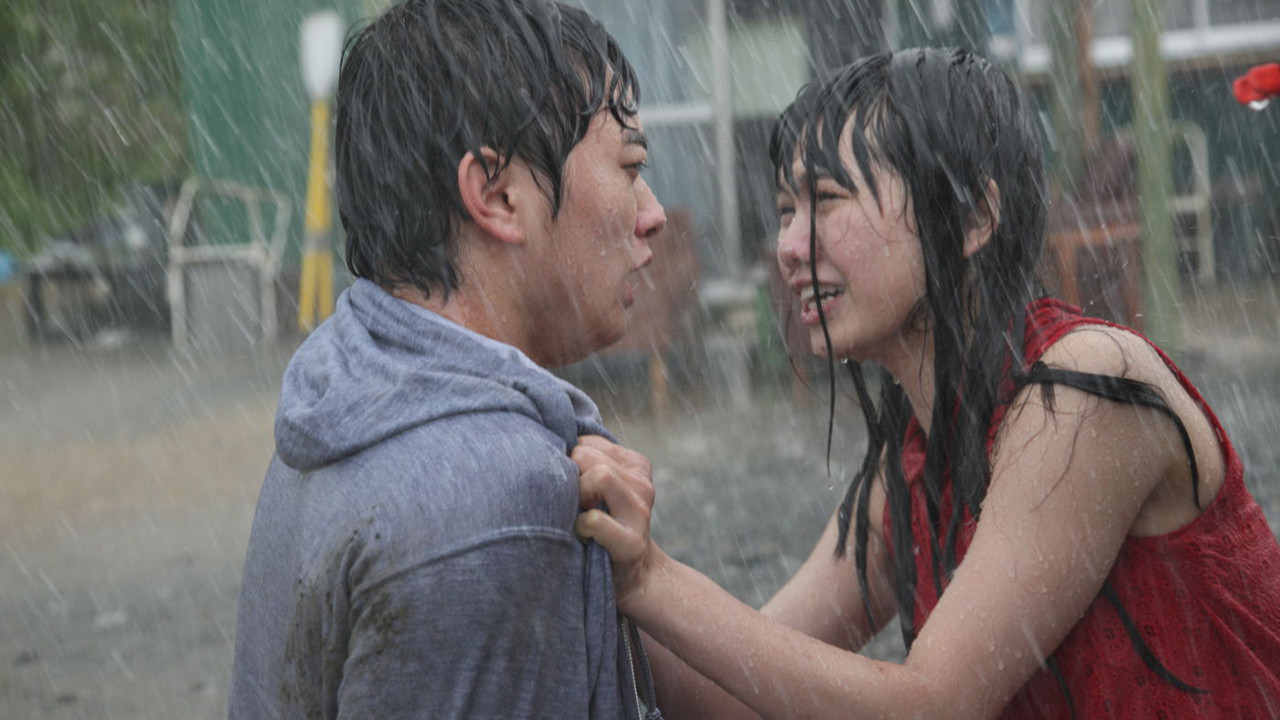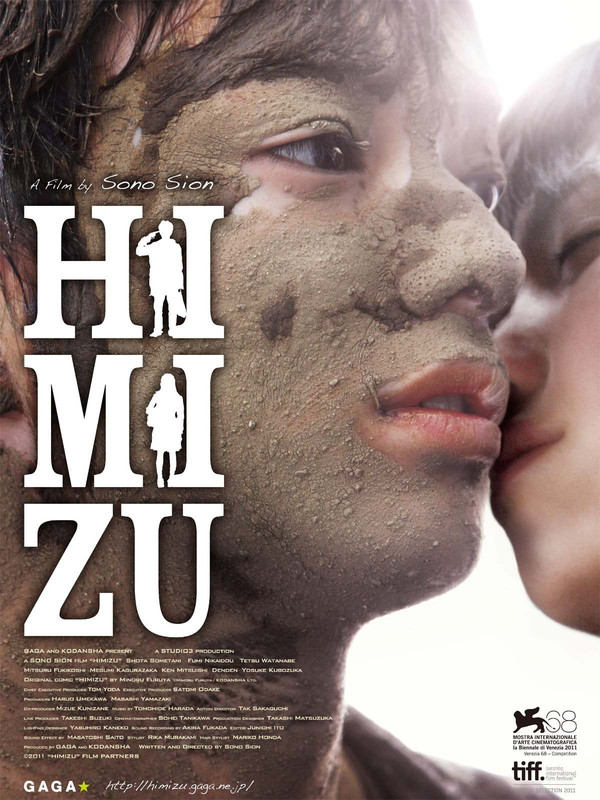Dir: Sion Sono
Over the last 18 months Sion Sono has become one of my favourite filmmakers thanks to the brilliantly bizarre likes of Noriko's Dinner Table, Cold Fish and his 4 hour long lunatic masterpiece Love Exposure, so I was really looking forward to this film, and hoping it would be a step up from the slightly disappointing (but heavily compromised) Guilty of Romance. Unfortunately, with the possible exception of Cronenberg's A Dangerous Method, Himizu is the most disappointing film I've seen this year, and is terrible to a degree I just didn't believe Sono capable of.
Himizu is an adaptation of a Manga, but as Sono was preparing the project the Japanese tsunami and the Fukushima disaster happened, prompting him to re-set the story in the wake of those events. 14 year old Sumida (Shota Sometani) lives at his family's boat house, his Mother has run off with her lover, and his drunk Father drops in occasionally to assault him and 'confess' that he wishes Sumida had died in the tsunami. Sumida's only friends are a group of older men - refugees living around the boat house, and his only dream is to live a completely normal life. Also trying to be Sumida's friend is his classmate Chazawa (Fumi Nikaidou), who is hopelessly in love with him, but despite her sunny disposition and attempts to help him, Sumida is annoyed by and dismissive of her. After being driven to an horrific crime, Sumida decides he should rid the world of bad people, and begins walking the streets with a knife.
Where to begin? I suspect that Sono fans will read that synopsis and recognise several of the director's recurring themes; a put upon teen abused by their family (this also applies to Chazawa), parents who abandon their children, violence, sin, forgiveness and whether certain people 'deserve' to live are all things that Sono has examined before, and watching Himizu is often like watching him put all his favoured themes and ideas in to a large sack and give it a vigorous shake, before pouring out a confused mix of elements that never gel into a satisfying whole.
Tone is often an interesting balancing act in cinema, and previously Sono has maintained a solid grip on films that balance it very delicately, Cold Fish, for instance, balances on a knife edge between brutal violence and comedy, but here the ability to balance opposing tones seems to have utterly deserted him. Violence is always present in Sono's work, and it's often harsh, but while Himizu doesn't contain his most brutal violent scenes it does feature much violence against women, and does so in a way so casual and so accepted that it fast becomes offensive. Chazawa, despite repeated scenes of her saving up her 'grudges' against Sumida in the form of stones she intends to throw at him, often seems like little more than a willing sponge for abuse.
When Himizu isn't offensive, or baffling us with abrupt and grinding tonal shifts, it's often simply boring, thanks to the fact that we are treated to tiny variations on the same scenes over and over again. Besides Sumida hitting or insulting Chazawa there is much repetition in scenes of Sumida's relationship with his Father, and of the scenes in the second half that see him stalking the streets looking for evil people, or explaining his actions to other people, this too is a hallmark of what I've seen of Sono's work, and I wouldn't mind so much about the repetition if the scenes all added up to give us a complete picture of the film's characters, but I don't really feel that they do. Sumida evolves a bit during the film, but his journey from mild-mannered teen to possibly insane future serial killer is much less credible than the very similar journey undertaken by Mitsuru Fukikoshi in Cold Fish, and unfolds in stuttering fits and starts rather than as a credible arc. Chazawa feels even thinner, never really progressing beyond her starry eyed adoration of Sumida despite how badly he treats her.
Except for its young leads, Himizu's cast is largely composed of the growing stock company that Sono works with. Cold Fish cast members Fukishoki, Denden, Asuka Kurosawa and Megumi Kagurazaka all appear, as does Love Exposure's Makiko Watanabe, the problem with these and the lead performances is that it's hard to tell how good they are through the film's uneasy and often shrill tone. With the older refugee characters - who, for some reason, seem almost to worship Sumida - Sono seems to be going for gentle comedy much of the time, and so the brutal violence that ensues when the gangster played by Denden shows up jars badly. Later next month we'll see William Friedkin's Killer Joe, and would that Himizu had one scene that combined darkness and humour as deftly as that film does when its gangster character shows up to demand payment on a debt.
 While Sono's films are always turned up to eleven it's only with this one that I have felt that style begin to grate, and I think that's because this time round there's really nobody to identify with. I could sympathise with Yu in Love Exposure, and with Syamoto in Cold Fish, but from the minute he began slapping Chazawa around, this film's lead character really began to alienate me from both him and the film, and given how extreme and sometimes outlandish the events of the film are, lacking a connection to its main character fatally undermined my interest in the ensuing two hours. As the film went on the bellowed dialogue, the repetition and the constant casual violence became boring, because I just couldn't see what, beyond stating his usual themes, Sono was saying here.
While Sono's films are always turned up to eleven it's only with this one that I have felt that style begin to grate, and I think that's because this time round there's really nobody to identify with. I could sympathise with Yu in Love Exposure, and with Syamoto in Cold Fish, but from the minute he began slapping Chazawa around, this film's lead character really began to alienate me from both him and the film, and given how extreme and sometimes outlandish the events of the film are, lacking a connection to its main character fatally undermined my interest in the ensuing two hours. As the film went on the bellowed dialogue, the repetition and the constant casual violence became boring, because I just couldn't see what, beyond stating his usual themes, Sono was saying here.
Despite the setting this doesn't feel like a film that addresses Fukushima or the tsunami in any meaningful way (hopefully Sono's next, Land of Hope, will prove more interesting on that front), nor does it develop any of those themes I mentioned above in any but the most prosaic way, which is deeply disappointing given how fascinating some of the director's previous films have been under their often crazy surfaces.
There are isolated moments that suggest something interesting, but they tend to go unexplored. Most notable is Chazawa's home life, in which we see that she locks herself away in her room because her (sigh) abusive Mother (Kurosawa) is so awful. The hilariously odd moment in which we see that Chazawa's Mother is building a gallows in her living room is striking, but it amounts only to a couple of small moments and never really comes into play. The whole film is also as strikingly shot as you'd expect of Sono, with a pivotal murder scene especially well designed, but this can hardly rescue the film from its frequent lack of internal logic or that the things being so prettily lensed are frequently dull or annoying.
By the ending, my screening was the scene of openly derisive laughter (some of it, sadly, coming from me) as we tried to restrain ourselves from joining in the seemingly endless bellowing of the last line. That last ninety seconds seemed almost to sum up the film for me; I felt like Sion Sono had just shouted at me for two hours, and I really wasn't sure what he had said or why.
★★☆☆☆
★★☆☆☆


No comments:
Post a Comment